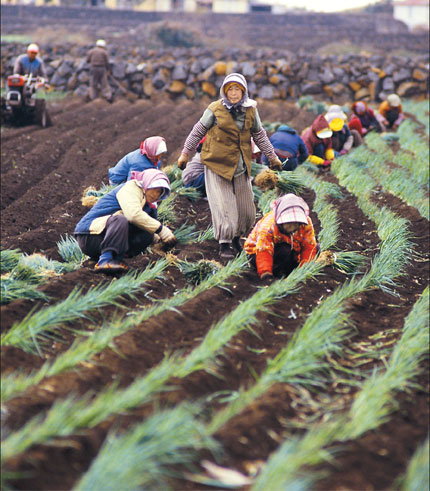Plight of kids, wives left behind
IF women hold up half the sky, Tian Jinzhen apparently holds up more than her share.
The 43-year-old peasant woman bid her husband and two kids a sad farewell shortly after the Chinese New Year family reunion, choked back her tears and returned to her toil.
Her daily work involves collecting firewood deep in the mountains, attending to domestic chores, taking care of her parents-in-law, growing nearly 2 hectares of tobacco, corn and rice, and managing the women's association in her home village in Huayuan County of central China's Hunan Province.
"No one can lend me a hand no matter how tired I am," says Tian. "I'm all alone."
Her husband, Long Jinyun, left home in 2002 to work as a miner in another county. Her children attend school away from home, a daughter in college and a son in senior high school.
Tian never complains about her burden. "We have to make enough money to pay for the kids' education."
Big debts
Last year, her husband made 20,000 yuan (US$1,470) in the pit. But the family is still in debt, as the children's tuition, food and lodging expenses on campus add up to more than 50,000 yuan.
At least half of the women in Tian's village, which has about 1,700 people, are left behind by husbands who, unhappy with the meager farming income at home, have migrated to cities for better paid jobs, says village head Tian Zongwan.
"Many are forced to bring up babies all alone," he says.
Except for the old and the physically impaired, almost every man in the village is working away from home - mainly at construction sites in southern China's Guangdong Province or manganese mines in the resource-rich counties of Hunan.
"It's almost a women's village," says the village head.
China is facing a yawning rural-urban wealth gap as the country leaps from poverty to prosperity. Despite the benefits of the booming economy, its vast rural areas and 900 million peasants still lag far behind cities in almost every aspect of economic and social life.
To be a wage earner, instead of toiling in fields and relying on the weather for bread, has been the dream for generations of Chinese farmers. This is why millions make their annual exodus to cities every spring, leaving their loved ones behind.
China had about 230 million migrant workers in 2009, of whom about 145 million hunted for jobs outside their home provinces, according to the National Bureau of Statistics.
A two-year survey ending in December 2008 found that the "left-behind population" in China's rural areas included 20 million children, 20 million elderly people and 47 million wives, according to researchers at China Agricultural University in Beijing.
"Left-behind women are shouldering 85 percent of the family's housework and agricultural production and 62.9 percent of them are physically overstrained," says Professor Ye Jingzhong, leader of the research team.
The team surveyed 1,200 left-behind wives in five rural provinces (Anhui, Henan, Hunan, Jiangxi and Sichuan), and almost 50 percent said their husbands came home only once every year.
The situation threatens to pull apart many rural families, as 8 percent of the women surveyed said they were facing a crisis in their marriage.
These women's health is also worrying. Professor Ye has found at least 30 percent are suffering chronic diseases.
Exhaustion
For Tian Jinzhen, growing tobacco all by herself is exhausting. From March to September, she spends at least four hours a day on the plants, spreading pesticide and fertilizer, weeding and watering.
Throughout the year she has to work like a horse, plowing the family's cropland and carrying 40 kilograms of grain - about her own weight - in a single harvesting trip.
"Other women carry up to 50kg, but I'm not as strong," says Tian. She suffers chronic pain in the back and knees, a result of overwork.
Read more: http://www.shanghaidaily.com/sp/article/2010/201003/20100324/article_432039.htm#ixzz0j5qscWMl

